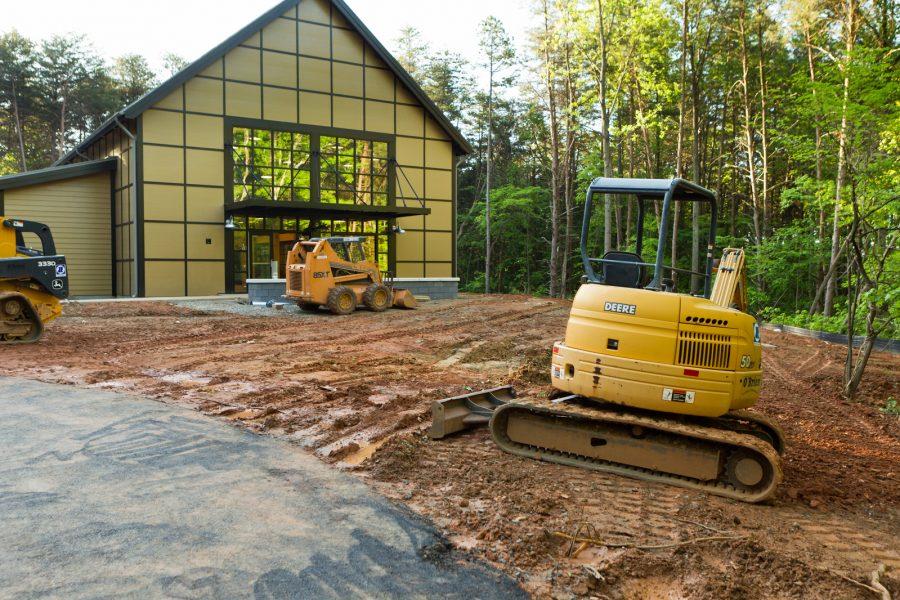The COVID-19 pandemic has resulted in a downturn in the economy and in an uncertain financial future for many businesses, institutions and colleges across the country and all over the world. Even with a sticker price over $75,000, the university isn’t immune to the monetary impacts of COVID-19, especially considering the university’s recent losses of revenue from on-campus housing fees that will be refunded, as well as summer study abroad programs that have been cancelled.
On April 8, Provost Rogan Kersh and Executive Vice President Hof Milam sent an email to faculty and staff explaining necessary financial decisions made on behalf of the university in regard to the suspension of capital projects.
“All existing and planned capital projects are suspended unless they are necessary for the health and wellbeing of our students, faculty and staff,” Kersh and Milam said in the email. “Suspended projects will be reevaluated to determine whether they should proceed.”
Suspended capital projects include the renovations of Wait Chapel and Luter Residence Hall, the replacement of the roof of the Reynolda House and the road project through Davis Field. A number of other smaller projects will also be postponed.
Milam spoke to the Old Gold & Black about the primary ramifications of the university’s decision to suspend capital projects.
“On the positive side, we save our cash for the most essential needs,” Milam said. “On the negative side, we miss an opportunity to get work done on campus when the campus is quiet and construction would be less disruptive.”
In addition to the impacts that the university’s decision has on increasing financial security while suspending capital projects, there are other factors to consider regarding the delay of certain construction projects.
On a positive note, the suspension of the Luter renovation might be beneficial for the university. In the fall, Luter will still be a housing option for freshman, sophomores and upperclassmen, even though it will not have been updated as recently as other residence halls. The availability of Luter could potentially help to meet a critical need for housing in the event that fall study abroad programs are cancelled due to COVID-19, resulting in the university needing to provide housing for students who had not originally planned to live on the Reynolda Campus.
However, there are also downsides to the suspension of capital projects. Since the Davis Field road project would have been the first step toward the construction of the College Academic Commons, progress toward establishing a new academic building to house the humanities might be delayed. The road project was intended to return the campus to the original plan for the university’s development, in which traffic flow would be directed through Davis Field.
Despite these setbacks, Milam also noted that other construction projects will continue to happen as needed this summer. Scheduled construction for the summer includes the conversion of Palmer and Piccolo Residence Halls to classroom space for academic use, work to resolve water penetration problems in Greene Hall and work to fix the air handling systems in Bostwick and Johnson Residence Halls.
Milam explained that although these construction projects will operate on a smaller scale than the capital projects would have, they also serve essential housing and academic goals of the university.
With the renovations scheduled to be completed before the fall semester begins, Bostwick and Johnson will house freshmen during the 2020-2021 academic year. The work to address humidity issues may help to curb outbreaks of mold in the residence halls, which has previously caused difficulties for many first-year students.
“The air handling work is an important first step toward the type of systems modernization we completed on the quad residence halls recently,” Milam said. “The improvements will enable better control over building humidity.”
The work in Bostwick and Johnson was determined to be a necessary procedure that must continue as scheduled, though the larger scale renovation of Luter clocking in at a grand $22 million needed to be postponed based on the financial situation of the university during the coronavirus pandemic.
Additionally, the construction of Palmer and Piccolo, which is scheduled to be completed by the beginning of the fall semester, will provide much needed classroom space for the university’s growing academic programs. The buildings will house the new major in Environmental Studies and the Department of Anthropology.
While campus construction continues, it is still uncertain when the renovations and work on capital projects will be able to resume, given the new financial reality of the coronavirus pandemic.
“There’s no way I can predict with any level of confidence,” Milam said. “The answer is so dependent on how COVID-19 progresses.”
















